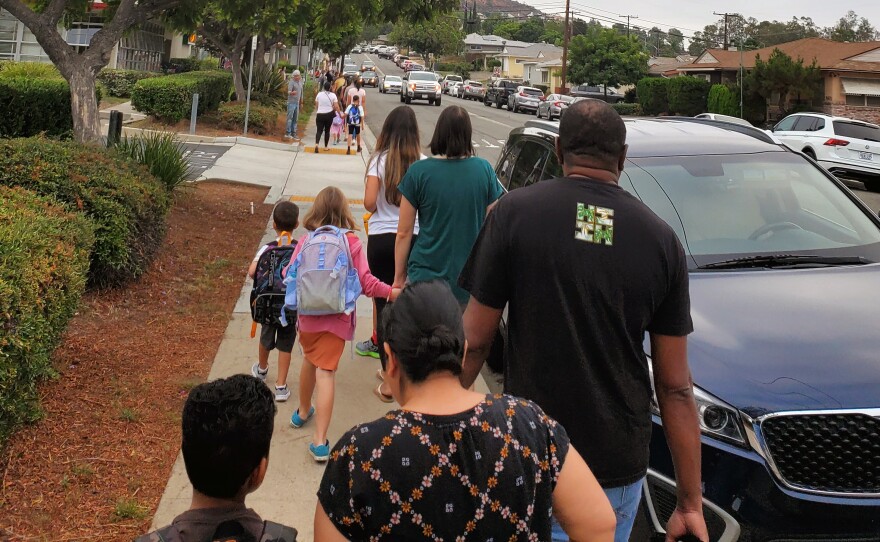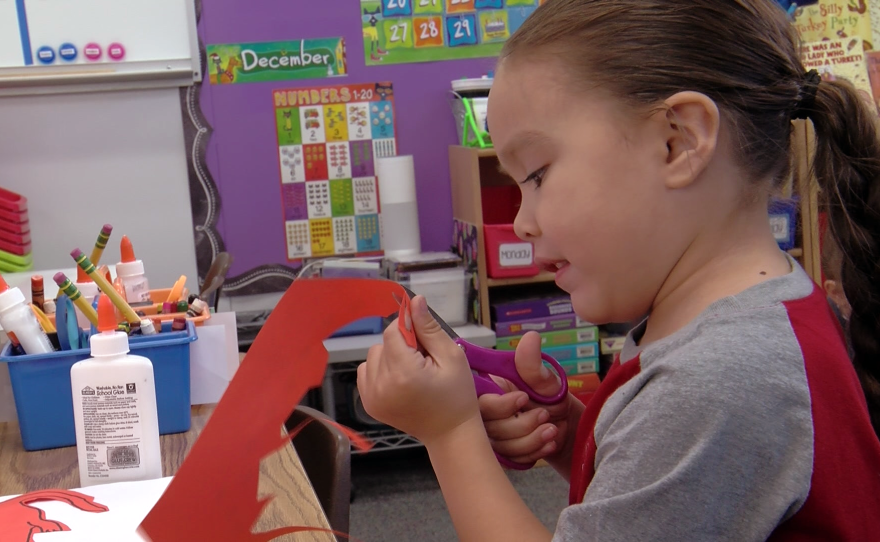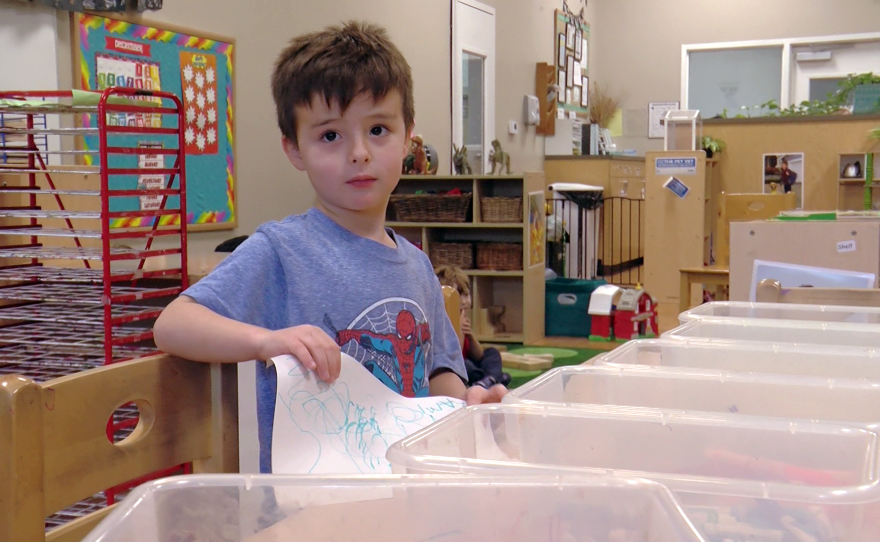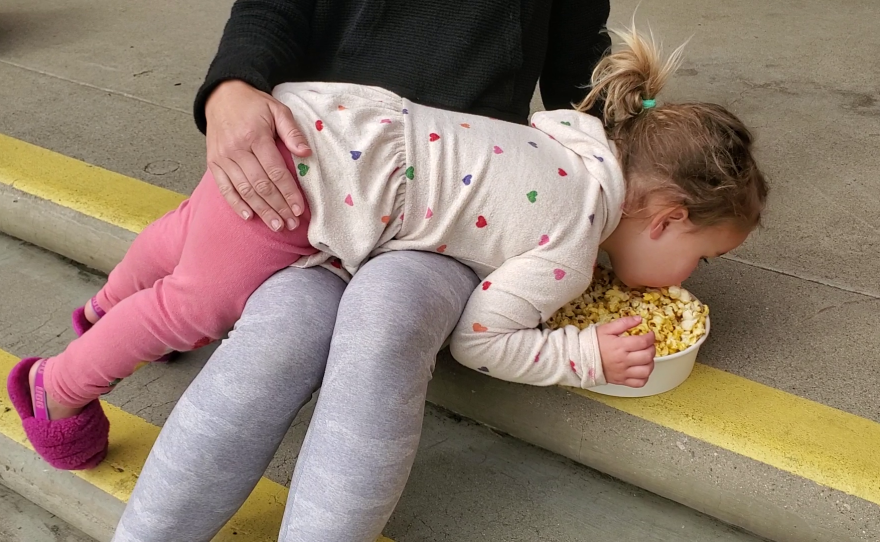Part two of a two-part series. Read part one.
The morning drop-off isn’t easy for many elementary schoolers and their parents. But it was downright brutal for Sara LaPietra and her 4-year-old son Teddy when he started in the new transitional kindergarten program at McKinley Elementary near Balboa Park.
Many San Diego schools don’t allow parents on campus. LaPierta says when school started in early September, she was supposed to stop at the gate and tell Teddy to walk himself to class.
It didn’t go well.
“He would lay down on the ground the second he got inside the gate, and I felt like I couldn't go in and do anything,” she said. “But also, he wasn't going to class, and so I'd just be watching him lay on the ground. I just felt it was awful.”
Now, the school has changed the rules so parents can walk kids to their classrooms. But, Teddy is still struggling to adjust to many other parts of being in an elementary school classroom.
“He's just been having behavioral issues that we never saw when he was in preschool, hitting kids and teachers and things like that,” LaPietra said. “He was running out of the classroom the first week or two, which obviously is a big safety risk and is concerning for us and for his teachers.”
Teddy is one of the many younger 4-year-olds who are attending transitional kindergarten, or TK, this year as part of a multibillion-dollar statewide expansion that Gov. Gavin Newsom says will transform early childhood education in California. By 2025, all four-year-olds statewide will be guaranteed a free spot in TK, with the goal of better preparing them for kindergarten and reducing the cost burden on parents.

Yet, many parents and early childhood education experts worry that the state is essentially sending a cohort of students to schools that aren’t ready for them.
The issues go beyond circumstances like the one faced by LaPierta and her son. State guidelines on how TK will be taught haven’t been fully implemented, which means some classrooms are not structured with the right balance of instructional and free play time. This is a recipe for behavioral problems, experts say.
“Right now, there's still a little bit of negotiation happening where you might walk into a TK classroom and you might see 75% of the time is devoted to instruction on math and literacy, and that's a red flag,” said Sascha Longstreth, the chair of SDSU’s Child and Family Development department. “Maybe they're a little too heavy on the elementary side and they need to introduce a more developmentally appropriate practice from preschool.”
Teachers lacking guidance
Teachers need more guidance on early education curriculum and preparation to work with younger children, said Alethea Arguilez, the executive director of First 5 San Diego.
“Really pushing for greater professional development because just taking early childhood education classes is really not enough,” Arguilez said. “And if you came from a K-6 or K-12 setting and you're going into TK and you really never worked with preschoolers, that's a whole different world.”
The state is working on a new credential that would apply to TK through third-grade teachers, but it won’t be implemented until 2025. This means families currently in TK are sort of like guinea pigs caught up in an experiment.
“At this age, children do need to have experiential learning," Longstreth said. "They need to have a lot of movement.”

Teachers in TK classes do have an assistant, which traditional kindergarten teachers don’t have, so the ratio of students to teachers is 12 to 1.
But while state curriculum guidelines allow schools to design class routines with more playtime, most TK classes at public schools adhere to the same elementary school schedule — often 15 minutes of outdoor recess in the morning and 20 minutes after lunch.
LaPietra said Teddy’s teachers have worked well with him and do seem to understand that he’s young, even for TK.
“But at the same time, they're professional teachers, and they do operate in a way that's different from a day care teacher,” LaPietra said. “They're not picking kids up and hugging them and holding them as much as a day care teacher would. They're probably not going to the bathroom and helping them in the bathroom and things like that. And so I think it's just more of a hands-off professional approach that many of them might not be used to.”
A San Diego parent whose son also started TK this year said in the first week of school she sent a note to his teacher telling her that her son “loved doing crafts and art projects and unicorns and rainbows.”
The teacher responded with a note saying her son had to practice writing his name with the appropriate capital and lowercase letters, said the parent, who wished to remain anonymous out of fear that she would harm her relations with the school.
San Diego Unified School District spokesman Mike Murad said no district officials were available for an interview, but he answered questions by email.
“Student schedules are integrated with purposeful play, recess, and physical movement, which are fundamental parts of (TK),” Murad said. “San Diego Unified builds these aspects into its program.”
He added that the benefits of TK are that it “provides students the opportunity to begin to learn not only the fundamentals of reading, writing and math, but social skills, such as listening and sharing, before they start kindergarten.”

Problems extend to after care
The concerns parents and early childhood experts have with TK extend to after care programs that are essential for working parents.
LaPietra said after care was yet another new system for Teddy to adapt to, which also didn’t go well. Staff frequently call LaPietra and her husband to come pick Teddy up early from McKinley’s after care program.
“They're very quick to be like, you need to come get him, we can't handle this, he's doing this, you need to come get him,” she said. “Even one day, it was raining, and they were like, ‘You need to come get him, because we don't really have anything to keep him entertained.’”
The San Diego County YMCA, which runs after care programs at many local schools, is training its staff specifically on how to work with younger 4-year-olds. Teachers are using things such as visuals and timers because 4-year-olds can’t tell time or read, said Ed Stanfield, the YMCA’s associate director of child and youth development.
“If you tell a 4-year-old, ‘Hey, two more minutes before we do something,’ that doesn't mean anything,” he said. “But if I can see throughout the day, you pick me up. I have snack, we go outside, we do an activity, and then step five is my caregiver comes and picks me up.”
But this training isn’t required by the state, so programs at other elementary schools might not be adapting to having younger children. And it wasn’t until a month into the current school year that TK students were even allowed in after care programs. State government code did not allow 4-year-olds to use the larger playground equipment and toilets that students 5 years old and up use.
Newsom had to sign an emergency bill that changed the law to allow 4-year-olds to use the larger toilets and playground equipment. Stanfield said it was the right solution at the time because TK expansion was already underway and parents had few options.
“Is it the right overall solution for society? That's a bigger question,” he said. “Is it the right solution to have 4-year-olds in those aftercare environments? I think it's challenging.”

Some parents not interested
Some parents feel the problems with the current version of TK outweigh the benefits and have decided to keep their kids in preschool. Among them is Sarah Alemany, whose daughter Valentina will be eligible in 2024.
“There's a lot of things that I just think were not well thought of and that the schools just weren't prepared for,” Alemany said. “I do think it's great that it's free, but I think there were better ways they could have implemented it. They could have given the money to preschools or let the parents choose where to send the kids because the preschools were actually built to be able to deal with kids that age.”
Meanwhile, LaPierta said she’s still glad she enrolled Teddy because he’s going through the growing pains of adjusting now instead of next year in kindergarten.
“We would just be in this position again next year and who knows what it would look like at that moment, maybe he'd be hitting kids harder or maybe they give you less grace the older you are,” she said. “And so I'm glad that now he'll go into kindergarten knowing the lay of the land at the school and knowing what it's like to sit in a classroom until 3 p.m..”
-
The uncertainty clouding California’s solar marketplace could be settled this week as regulators consider a proposal that changes the rules for electricity generated by rooftop solar. In other news, Baja California prosecutors this week sentenced two cartel hit men to 25 years for the murder of journalist Margarito Martinez. Plus, we take you to San Diego's only nonprofit cat lounge.
-
We speak to Councilmember Kent Lee, who was sworn in Monday to represent the city of San Diego’s District 6. This includes Mira Mesa, Kearny Mesa, most of University City, Sorrento Valley and portions of Scripps Ranch. Plus, the uncertainty clouding California’s solar marketplace could be settled this week as regulators consider a proposal that changes the rules for electricity generated by rooftop solar. And, to fight climate change and meet renewable energy goals, the Biden Administration has championed the opening up of federally-owned desert lands in California to develop massive renewable energy projects, like industrial-scale solar.











